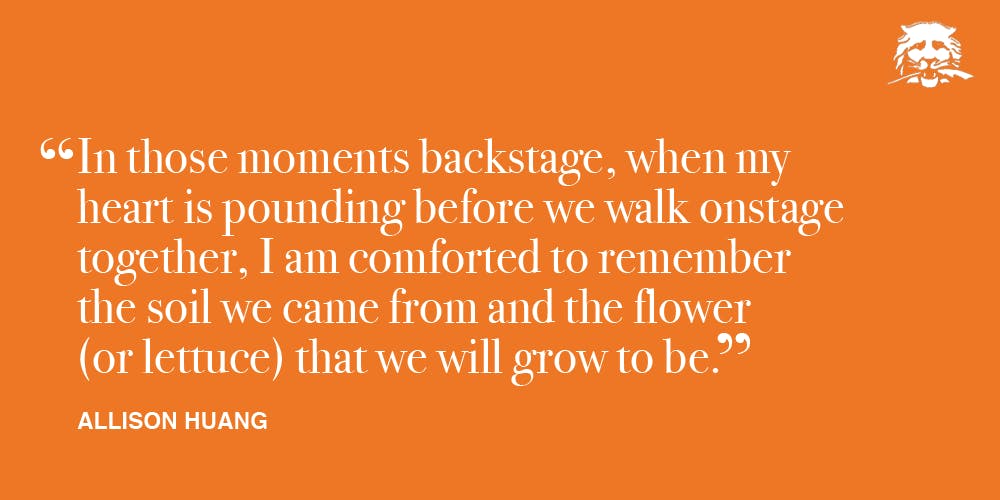I’ve been discovering how to use space.
I spent the Princeton Pianists Ensemble “Hell Week” playing in rehearsals in preparation for the spring show, Act II. I am in a two-piano, four-hand ensemble (with one pianist per piano) with another pianist, Amanda Cheng ’20, playing my own arrangement of “Waltz” from Aram Khachaturian’s Masquerade Suite. I had never heard this piece before I arranged it.
When arranging, one encodes sound onto the page. The music is thus alive in the arranger’s mind, already formed and shaped by their imagination, before it is played. When rehearsals swung around, I walked into our small rehearsal room knowing how I wanted everything to sound, and I was able to execute this conception. I developed this piece based on my experiences performing solo piano for almost 14 years.
I quickly learned that the piece we had honed in our small rehearsal room morphed and changed when played on the stage. What I had learned as a solo pianist did not prepare me for this. We moved from a small room in which we could easily hear each other — the two pianos essentially functioned as one instrument — to McAlpin Rehearsal Hall, a performance room able to seat 100 people and where the sound bounced around the room when we played on two D Concert Grand Steinways. We were commandeering animals in their own right.
When I first played in the hall at an in-house rehearsal, the space was completely unfamiliar. All of a sudden, Amanda and I were 15 feet farther apart. I felt like I was glancing over an interminable, glossy black distance as Amanda and I tried to match sound for sound. We could not. The “Waltz” began to slow and slow, lagging further until it no longer danced.
I spent the last week learning to accustom myself to McAlpin, the new environment and space for our piece. We adapted and integrated much more pronounced movements into our playing, which allowed us to communicate the waltz-step to one another and also to fill in the space between us and the audience and take ownership of the large pianos before us. Movement had been a big no-no when I played solo. Because we wouldn’t be able to hear one another otherwise, we increased the volume of some moments in the piece that I had hoped to be soft; thus, the revised section evoked a different color from what I had planned. In order to accommodate the space, we dissolved the mandates I had formed from my experiences as a soloist and from our rehearsals in our small classroom. This was the same music on the page in theory, but it became something different in the context in which it was played.
In the process of adapting my arrangement to the McAlpin stage, I first resisted. I thought we were twisting the music to suit its context and thus distorting its original form. The way in which the piece changed made it into its own species entirely. Luckily — and I say luckily because my stubbornness would have been to my detriment — I was forced to accept the changes. Gradually, I found enjoyment in the performance of this new species, too.
I think that adapting my music to the context in which it would be performed is like transplanting a plant into new soil. A head of lettuce will grow differently depending on the nutrients of the soil (or nutrient solution) it is in. If the soil is nitrogen-rich, the lettuce tends to produce more leaves, which is nice for the consumer. If the soil is potassium-poor, the heads of the lettuce close up as the leaves grow and thus cause the lettuce to be heavier, which is ideal for the farmer. Transplanting can yield new products and new experiences. I suppose this image could be extended to this campus community: Many of us have been uprooted from our past lives and replanted here, a context that has yielded its own unusual and distinct fruit. Some of us may move on from here, yet we would do well not to forget who we are before we go.

At least for this PPE concert, considering context has inevitably opened up the question of purpose: Why was I so resistant to adapting my piece? I hesitated because I had not anticipated these changes, and because they went against much of what I had learned as a soloist. But this is the Pianists Ensemble, and I do not walk onto the stage as a soloist. I take as much as I have learned from solo piano as I can, and then my partner and I must drift and change according to the context. In those moments backstage, when my heart is pounding before we walk onstage together, I am comforted to remember the soil we came from and the flower (or lettuce) that we will grow to be.
Allison Huang is a first-year from Princeton, N.J. She can be reached at ah25@princeton.edu.









